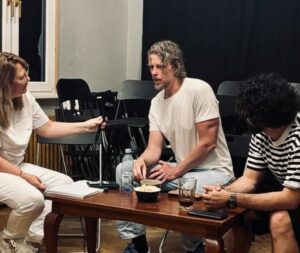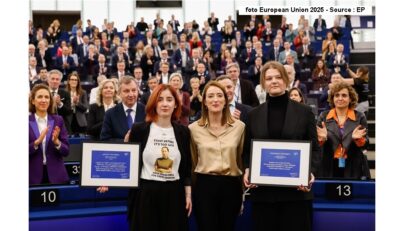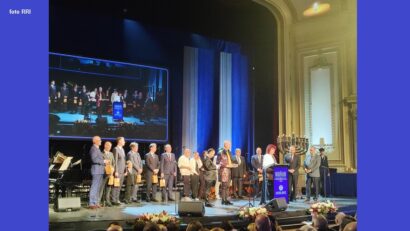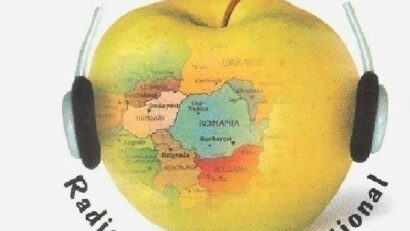Break of Day: the anatomy of a show on stage in Bucharest
When the war in Ukraine began, theatre director Vlad Chiriţă found himself confronting a deep unease, both personal and collective. It was then, by chance, that he came across “Break of Day”, a play by Fredrik Brattberg. The story, centered around a family grappling with an outside world in crisis, struck a powerful chord.

Diana Vijeu, 27.06.2025, 15:40
When the war in Ukraine began, theatre director Vlad Chiriţă found himself confronting a deep unease, both personal and collective. It was then, by chance, that he came across “Break of Day”, a play by Fredrik Brattberg. The story, centered around a family grappling with an outside world in crisis, struck a powerful chord.
Vlad Chiriţă: I discovered it about two years ago and read it in French. It was like the play had already started inside me. My wife, my daughter, our own questions about whether to stay or to run, everything resonated.
“Break of Day” is not a play on war, it’s intimate, domestic, yet its stakes are existential. “The outside world is crumbling and that cracks the rhythm of the family. That felt very familiar”, the director says. “I knew immediately I wanted to stage it.”
It wasn’t immediate, however. Issues with the rights and scheduling delays slowed the process. But eventually, with the support of the Hearth Association and the offer to use a unique space, a real house in Bucharest, once home to Radio Romania journalist Silvia Kerim and her late husband, director Mircea Veroiu, the production found its home.
Old furniture, sepia tone pictures, candles, painting frames hanging from exposed brick walls make up the perfect set design for a play which is nothing but a subtle exploration of the fragility of family relationships in the context of a crisis.
Having studied theatre, dance and cinema in France, at the University of Metz, the Sorbonne, and finally Nanterre, Vlad Chiriţă is no stranger to classical forms. But his artistic heart lies elsewhere. “I’ve never staged a classical play outside of school. I’ve always needed work that’s in dialogue with the present moment”, he says.
“Break of Day” also marks his return to stage, after a period dedicated to cinema, which has left an indelible mark on his work:
Vlad Chiriţă: The experience of working in film, of seeing, made me think very cinematic. My way of working theatre changed through this, through this lens. I think it is important when you switch to other domains, when you start to do something else, to let everything permeate and try to enrich your experience and try to get into that and see how this change, how this can affect you, change you, and make you do maybe different forms that you did prior.
In turn, Fredrik Brattberg started his career in music and has composed over forty works before writing drama. It is from music that he draws sap of inspiration and he uses rhythm, particularly repetition, in his theatrical writing, for which he has received numerous awards, including the prestigious Ibsen Prize, for “Returns”, in 2012. His works have been translated into twenty languages and are being staged or read out in Germany, France, Norway and Romania. Upon his arrival in Bucharest, I met Fredrik Brattberg in the Kerim House:
“Words are atoms of my world”, one of Romania’s most outstanding contemporary playwrights, Matei Visniec, once said. What is YOUR world made of?
Fredrik Brattberg: I need art. I need music for the world to open up to me. Without them, the world feels closed, hidden, difficult to fully grasp. But when I experience a piece of music or see theatre or visual art, I suddenly begin to understand. So for me, the world is indirect. I reach it through a medium, through something else. That’s the only way I can approach truth or find the right place to stand in life.
Does music play a central role in your life?
Fredrik Brattberg: Absolutely. You know, you can attend a funeral and not feel anything at first, not really comprehend the depth of the event. But then, suddenly, music begins playing in the church and everything shifts. You understand where you are and what’s happening. Music opens up the room, it opens up my life. I need it to fully live.
The title “Break of Day” suggests multiple meanings: the dawn of a new day or a breakdown, something ruined, that was why I wanted to know what it really meant to Fredrik Brattberg. A double metaphor?
Fredrik Brattberg: Exactly that. At the end of the play, there’s a literal sunrise, but the day is also breaking into pieces. It’s like wearing glasses: you don’t notice them because you’re looking through them. But when they break, you finally see them as an object. That’s the same with the day, we take it for granted. In this play, the day is fractured and suddenly you see it. You see your routines. You see what brings the family together. And then, in the end, the dawn returns, bringing something new.
“Break of Day” is played this summer in the Kerim House, still veiled in scents of yore, but full of the magic of young creators, who use words to create new worlds!































